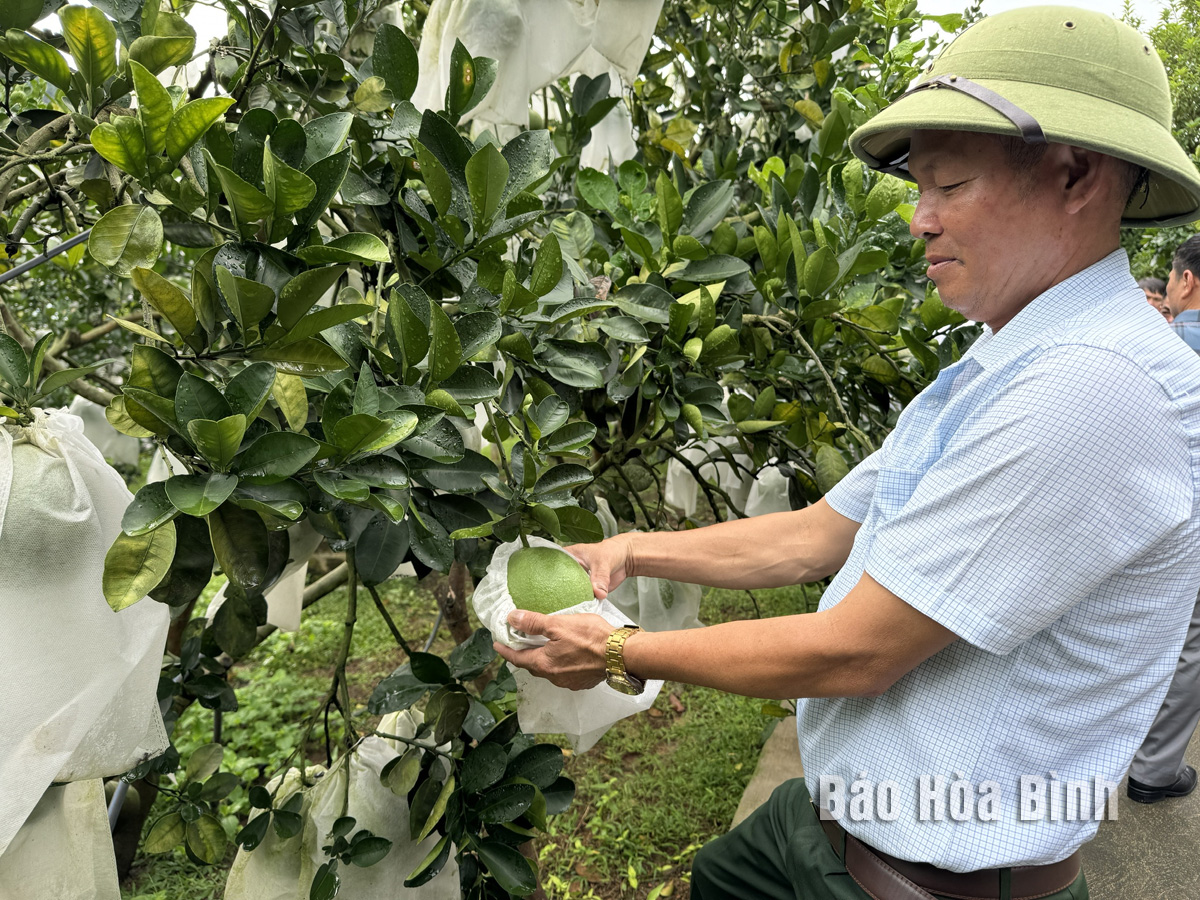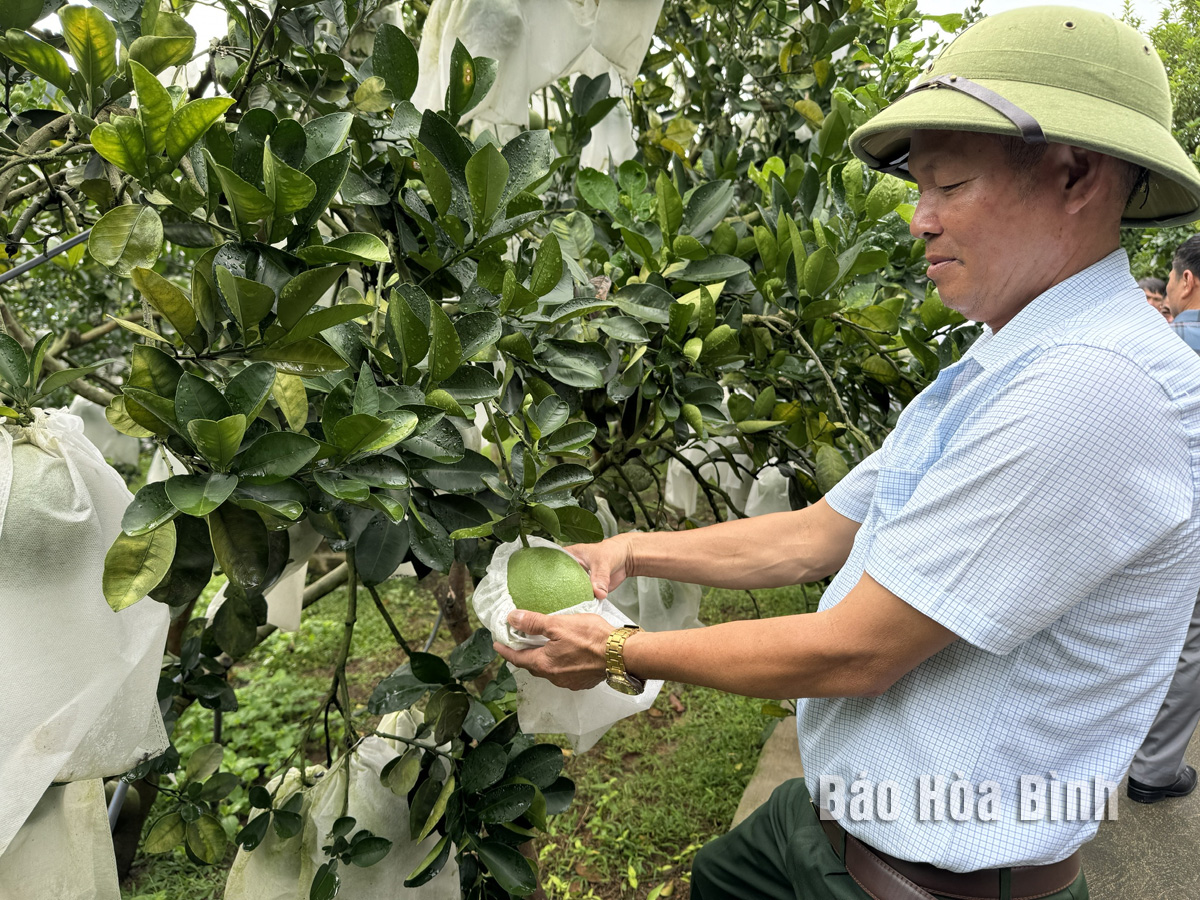
Maintaining growing area codes and packing facility codes in accordance with regulations is a mandatory requirement for agricultural products to be eligible for export. Recently, the Department of Agriculture and Environment of Hoa Binh province has intensified technical supervision of designated farming areas and packing facilities to safeguard the "green passport" that enables its products to access international markets.
Farmers in Ngoc Luong commune, Yen Thuy district, take care of pomelo orchards that have been granted farming area codes.
Since the beginning of this year, the Plant Production and Protection Sub-Department has advised the department on issuing, managing, and monitoring farming area and packing facility codes for exports. Communication and supervision have been strengthened at the district and city levels, with technical support provided for cultivation and regular field inspections to detect harmful pests.
The Sub-department also organised a training workshop in Kim Boi district focused on the issuance, management, and oversight of export certifications. Participants received detailed guidance on the procedures for inspection, maintenance, and compliance with international standards, particularly those required by high-potential export markets.
Additionally, the Sub-department conducted technical inspections of five growing areas and two packing facilities in Tan Lac and Yen Thuy districts. All inspected sites were found to be fully compliant with current regulations and met the requirements to retain their codes. No violations were recorded. The packing facilities met all technical standards, including maintaining clean processing environments, ensuring separate storage for raw and finished products, and using appropriate equipment for preliminary processing and packaging, in line with guidelines from the Department of Plant Production and Protection and requirements of importing countries.
Notable examples of compliance included Binh Minh Services and Rural Development Cooperative, the Tan Huong 1 Clean Grapefruit Growing Cooperative Group (Dong Lai commune, Tan Lac district), and Dai Dong Agricultural Cooperative (Yen Thuy district). These producers have diligently maintained cultivation logs, adhered to technical protocols in crop care, and used fertilisers as recommended.
Their adherence to traceability and production record-keeping has enabled their products to qualify for export to demanding markets such as the UK, the US, and the European Union. Thanks to these certifications, Hoa Binh’s key agricultural products, including Tan Lac red pomelo, Dien pomelo, longan, and bamboo shoots, have successfully entered new markets, thereby increasing export value and enhancing brand reputation.
Nguyen Hong Yen, Head of the Sub-department of Plant Production and Protection, emphasised that maintaining farming area codes not only ensures the quality and credibility of Hoa Binh’s produce but also serves as a prerequisite for the province’s deeper integration into global markets.
Looking ahead, the Department of Agriculture and Environment and its subordinate agencies will continue to work with localities to conduct both regular and unexpected inspections. They will also guide growers in using electronic cultivation logs, updating national software platforms, promoting investment in upgrading preliminary processing and packing facilities, and enhancing the capacity of local agricultural personnel.
According to data from the Hoa Binh Provincial Party Committee, the industrial production index for the first six months of 2025 is estimated to have increased by 20% compared to the same period last year. This marks the highest year-on-year growth rate for this period since 2020.
In the first six months of 2025, Hoa Binh province’s export turnover was estimated at 1.145 billion USD, marking an 18.11% increase compared to the same period in 2024. Import turnover was estimated at $ 804 million, a 17.15% increase, which helped the province maintain a positive trade balance.
The lives of the ethnic minority farmers in Tan Lac district have gradually improved thanks to the new directions in agricultural production. This is a testament to the collective strength fostered through the professional associations and groups implemented by various levels of the district’s Farmers’ Union.
With the motto the "product quality comes first,” after nearly one year of establishment and operation, Muong village’s Clean Food Agricultural and Commercial Cooperative, located in Cau Hamlet, Hung Son Commune (Kim Boi district), has launched reputable, high-quality agricultural products to the market that are well-received by consumers. The products such as Muong village’s pork sausage, salt-cured chicken, and salt-cured pork hocks have gradually carved out a place in the market and they are on the path to obtaining the OCOP certification.
In the past, the phrase "bumper harvest, rock-bottom prices" was a familiar refrain for Vietnamese farmers engaged in fragmented, small-scale agriculture. But today, a new spirit is emerging across rural areas of Hoa Binh province - one of collaboration, organisation, and collective economic models that provide a stable foundation for production.
With the motto "product quality comes first," the Ban Muong Clean Food Agricultural Cooperative in Hung Son commune, Kim Boi district, has gained consumers’ trust after nearly a year of operation. Their products, including Ban Muong Vietnamese pork sausage and ready-to-eat salt-cured chicken and pig's trotters, are gradually establishing a solid market presence, with efforts underway to complete their One Commune-One Product (OCOP) certification process.



